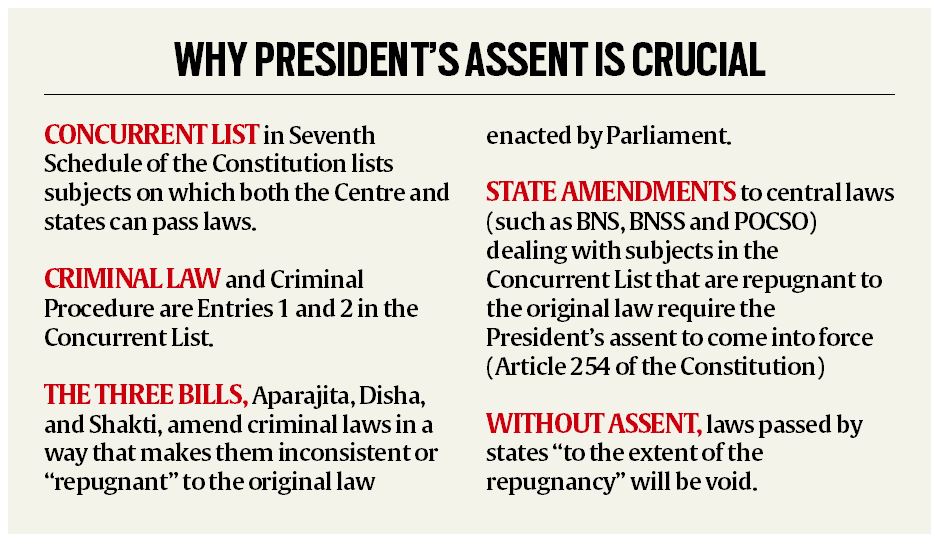State changes in rape law

- 05 Sep 2024
The recent legislative changes in rape laws across West Bengal, Andhra Pradesh, and Maharashtra represent significant shifts towards more stringent punishments and expedited judicial processes.
West Bengal: Aparajita Bill
Features:
- Death Penalty: The Bill introduces the death penalty as the mandatory punishment for rape where the victim dies or is left in a permanent vegetative state. It also extends the death penalty to all cases of rape, including gang rape of women above 18.
- Special Institutions: It mandates the creation of Special Task Forces in each district for investigating rape cases, and Special Courts for expedited trials.
- Changes to Existing Laws: The Bill amends the Bharatiya Nyaya Sanhita, Bharatiya Nyaya Suraksha Sanhita, and the Protection of Children Against Sexual Offences Act (POCSO), introducing rigorous imprisonment and increasing penalties for repeat offenders and for disclosing victim identities.
- Acid Attacks: The Bill increases punishment for acid attacks to rigorous imprisonment for life.
Special Provisions:
- Establishes strict timelines for investigation and trial, aiming for efficiency.
- Includes amendments to the POCSO Act to align with the new death penalty provisions.
Andhra Pradesh: Disha Bills
Features:
- Death Penalty: The Disha Act introduces the death penalty for rape, including for minors below 16, gang rape, and repeat offenders.
- Special Courts and Teams: Similar to the Aparajita Bill, it creates Special Police Teams and Exclusive Special Courts in each district to handle these cases.
- Women and Children Offenders Registry: Proposes a registry to track offenders, enhancing transparency and accountability.
Special Provisions:
- Focuses on speeding up the investigation and trial process.
- Proposes comprehensive measures including a registry to maintain offender data, although this may have privacy implications.
Maharashtra: Shakti Bill
Features:
- Death Penalty: The Shakti Bill also introduces the death penalty for rape cases, with an emphasis on “heinous” cases such as acid attacks.
- Shortened Timelines: Like the other bills, it reduces the timeframes for investigations and trials.
- Web Platform Obligations: Imposes penalties on social media and internet platforms for failing to provide data requested by investigators in cases of crimes against women.
Special Provisions:
- Includes specific provisions for acid attacks with potential death penalty in severe cases.
- Addresses the role of web platforms in aiding investigations, reflecting concerns over digital evidence.
Comparative Summary
Death Penalty:
- West Bengal and Andhra Pradesh both introduce the death penalty for various rape offenses, including cases involving minors and gang rapes.
- Maharashtra includes the death penalty but emphasizes "heinous" acid attack cases more explicitly.
Special Institutions:
- All three states create special investigative teams and courts to handle rape cases more swiftly, though the exact mechanisms and timelines differ slightly.
Amendments to Existing Laws:
- West Bengal and Maharashtra both amend the POCSO Act to include the death penalty.
- Andhra Pradesh also makes amendments but with a broader focus on creating a comprehensive registry.
Additional Provisions:
- Maharashtra uniquely addresses the role of web platforms in investigations, an aspect not covered by the other states.
- Andhra Pradesh includes the establishment of an offender registry, which may have broader implications for data privacy and offender tracking.
